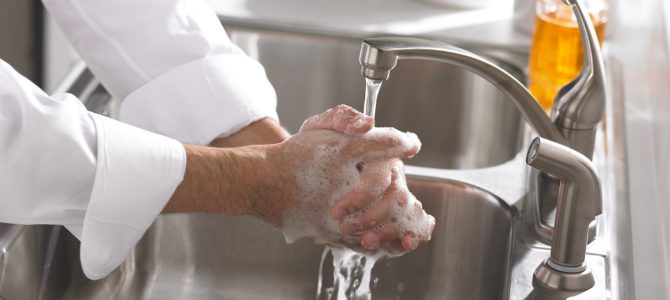
Coronavirus news coverage is bewildering right now. Much of the news is alarmist, especially as cases without clear links to travelers increase. How frightened do we really need to be, and how can we, as average Americans, keep our families safe?
What We Know about Coronavirus
According to the World Health Organization: “Coronaviruses (CoV) are a large family of viruses that cause illness ranging from the common cold to more severe diseases such as Middle East Respiratory Syndrome (MERS-CoV) and Severe Acute Respiratory Syndrome (SARS-CoV). A novel coronavirus (nCoV) is a new strain that has not been previously identified in humans.”
In simpler terms, this coronavirus is part of a bigger family of viruses, responsible for illnesses as mild as colds or as serious as SARS. This current coronavirus is called SARS-Cov-2.
Its outbreak started in China and much of the initial information we had about the rates of infection and transmission came from China. It can be hard to verify, though, because China has lied about coronavirus and the doctor who tried to bring attention to the beginning of the outbreak, and routinely attempts to censor information.
Now that coronavirus has spread beyond China, with significant numbers of cases in South Korea, Iran, and Italy, we are able to access better medical information about mortality rates and typical infections. That information shows more than 80 percent of those who contract coronavirus have a mild illness and will recover fully.
Vaccines and Biomedical Research
A potential treatment just began two stage-three clinical trials for coronavirus treatments. It’s called remdesivir by Gilead Sciences, Inc. These trials begin in March in areas with high numbers of COVID-19 cases and may present a helpful treatment for those most at risk by the disease.
Remdesivir has been studied in SARS and MERS outbreaks, and was part of a previous clinical trial during the Ebola outbreaks. Scientists hope to begin having data by April about whether it can help patients.
A company named Moderna has a vaccine (a mRNA targeted vaccine) ready for the National Institutes of Health to review. Its trial will begin in the coming months, hopefully by April, with data released as each phase of the vaccine trials progresses. So far other treatments for COVID-19 focus on supportive care, or helping the affected person with the body system that is most at risk.
How Families Can Protect Themselves
Seasonal influenza is still a problem across America, with widespread activity across the country, according to the Centers for Disease Control. Doctors and hospitals are already working hard to deal with a high number of flu cases, creating a dangerous situation in areas with limited health care choices if coronavirus starts infecting large numbers of Americans.
Dr. Hotez, a dean at Baylor College of Medicine in Houston, also points out the importance of getting a flu shot: “We don’t vaccinate enough Americans. We’ve had 16,000 flu deaths this year, including a hundred kids, vast majority not vaccinated despite recommendations. If our state and local health departments have to fight two epidemics at once, like flu and this coronavirus, they’re going to lose. It’s not possible. So that’s why I’ve been telling them. Everyone, they should get their flu vaccine.”
Wash Your Hands
Without a vaccine for coronavirus, families need other ways to protect themselves. The most important thing clinicians and medical groups around the world keep emphasizing is the importance of hand-washing.
Katelyn Lovelis, an infection preventionist, describes the importance of handwashing during illness outbreaks: “Hand washing with soap and water or the use of alcohol-based hand rub is extremely important for prevention of communicable diseases, including novel coronavirus or COVID-19. This along with staying home when you are sick (self-isolating), practicing good respiratory etiquette (coughing/sneezing in the crook of your elbow and not in your hands), and avoid touching the face as hands commonly spread illness to our nose, mouth, and eyes.”
Handwashing is an important tool in stopping or slowing the spread of this virus, especially when done properly. There is a right way and a less ideal way to wash your hands, so review this article by Nicole Fisher on the best way to do it.
PSA for non-science folks: Wonder why everyone is emphasizing hand washing? Sounds banal, but soap really IS an amazing weapon that we all have in our homes. This is because coronavirus is an "enveloped" virus, which means that it has an outer lipid membrane layer.
1/3— Karen Fleming (@KarenFlemingPhD) February 28, 2020
Stop Buying Masks
Next, stop buying masks. They aren’t helping prevent healthy people from catching COVID-19, but consumers clearing the shelves and warehouses, and stealing them from hospitals and clinics, are creating problems for doctors, nurses, and other hospital workers. Sick people also need these masks, because their use can slow the spread of disease.
Many masks will not protect you because they cannot screen out materials as small as viruses, and those that can need to be properly fitted to ensure air isn’t coming in along the edges. Instead, stop touching your face. Tell your kids to stop touching their faces. I know this is hard. But practice these skills, wash hands frequently, and pull those tiny fingers out of noses instead of ignoring it. Now’s the time to kick that booger habit.
Don’t Panic, But Prepare
Dr. Rebecca Katz, the director of the Center for Global Health Science and Security at Georgetown, told Vox: “The most important recommendation is don’t panic, but prepare. We’re not going into a crazy movie situation where the world is on fire, but we may be going into a situation where there are people walking around who are sick.”
“Don’t panic, but prepare,” is a perfect mantra for when it’s really tempting to buy 30 pallets of water or 50 pounds of dry beans you’ll never eat. There’s no sign that our grid is in danger of imploding, so we should have electricity and water.
But we could see people who are sick for a few weeks. Sick people need to stay home, not spreading coronavirus or influenza. The flu alone is still circulating in America and has sickened some 32-45 million Americans, killing 18-46 thousand Americans just this year.
Do you have sick supplies on hand so your family doesn’t need to go to the store and expose people if illness strikes? Soup, fever reducers, oral rehydration drinks like Pedialyte or Gatorade, and other typical illness supplies are good to have on hand. Get extra diapers and wipes if you have a little one, extra formula if you use it, and some bottles so you’re washing less if both parents are under the weather.
Discuss Childcare Plans
Other countries and even places in America now are closing schools and daycares, causing logistical issues for families with small children in which both parents work. In particular, it’s important to note that so far small children are not getting as sick from coronavirus as adults, so watching children could put grandparents and other older members of the community at risk.
Coronavirus is increasing the number of people working from home and asking their employers for permission to work from home. The CDC is encouraging what they call social distancing, or canceling in-person meetings, conferences, and other gatherings of people.
Not all jobs can be done from home, so employers and employees need to have some open discussion on this. In addition, maintain distances from people in public, particularly if they’re coughing or sneezing.
Talk With Your Kids
My kids range from almost 16 years old to 7, and all of them have heard about this on the radio and from adults and friends talking about it. Don’t scare them, but ask what they’ve already heard and offer some age-appropriate and factual information to help them deal with what’s happening.
Kids who go to school might be worried about schools closing (or excited about it). Kids could be worried about their friends, families, loved ones, or themselves getting sick. I’ve found it really helpful to discuss this in comparison to seasonal influenza, and to practice how to wash hands, because again, that’s the best tool average people have right now.
Many families in America, including mine, have people on daily medication. I’m so glad we live in a time with smart researchers who make life-saving drugs, and in a country where shortages are rare. The Food and Drug Administration is monitoring whether drug shortages are coming. Many drugs are made, at least in part, in China.
Officials are warning that if everyone rushes to stock up on medications they don’t need right away, it will make shortages worse. Experts do agree that if insurance allows, having an extra one-month to a 90-day supply on hand is not a bad idea.
The situation can feel pretty dire and shocking from the news coverage, especially as we see travel slow down and quarantines set up. But there are concrete things families can do to safeguard themselves, especially practicing good handwashing, keeping a distance from sick people, and having some basic supplies on hand at home.
Coronavirus might be the newest infectious illness Americans are facing, but it isn’t the first and is unlikely to be the last. Common sense and careful hygiene appears to be an important tool in slowing the spread and is something each of us can practice daily.









